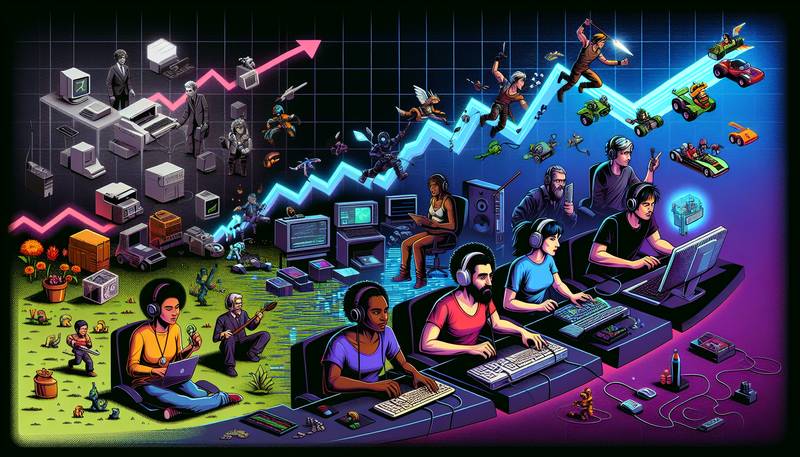The Rise of Indie Game Developers: Changing the Gaming Landscape

In recent years, the gaming industry has seen a significant shift in the balance of power. Once dominated by big-name studios with deep pockets, the landscape is now being shaped and transformed by a new generation of game developers - the indies. These independent game creators are not only changing the way games are made, but they are also altering the way we think about and play games. In this article, we will explore the rise of indie game developers and the impact they are having on the gaming landscape.
The Emergence of Indie Game Developers
Indie game developers have been around for decades, but it wasn't until the mid-2000s that they began to gain significant traction. The advent of digital distribution platforms like Steam and the Apple App Store made it easier for independent developers to reach a wider audience. With the development of powerful yet affordable game development software, such as Unity and Unreal Engine, indie developers now had the tools to create high-quality games without the need for a big budget.
Indie games like Braid, Super Meat Boy, and Fez quickly gained popularity and critical acclaim, showing the industry that small teams with creative ideas could compete with the big players. These early successes paved the way for future indie hits like Undertale, Stardew Valley, and Among Us, proving that indie games could not only be successful but could also become cultural phenomena.
The Appeal of Indie Games
One of the main reasons for the rise of indie game developers is the appeal of their games. Indie games are often praised for their originality, creativity, and willingness to take risks. Without the pressure to meet sales targets or cater to a mass audience, indie developers have the freedom to experiment with new gameplay mechanics, art styles, and storylines that mainstream studios might shy away from.
Indie games also offer a level of personalization and intimacy that is difficult to find in big-budget titles. Many indie games are developed by small teams or even solo developers, which can result in a more cohesive and unique vision. Players often feel a closer connection to the creators and the game itself, as they can see the passion and hard work that went into its development.
The Impact on the Gaming Industry
The rise of indie game developers has had a profound impact on the gaming industry as a whole. The success of indie games has shown publishers and investors that there is a market for innovative and unconventional games. This has led to an increase in funding and support for indie developers, allowing them to grow and reach even larger audiences.
Indie game developers have also raised the bar for quality in the gaming industry. With so many indie games available, players have come to expect more from their gaming experiences. Mainstream studios are now paying attention to what indie developers are doing and are incorporating some of their ideas and innovations into their own games.
Challenges Faced by Indie Game Developers
Despite their successes, indie game developers still face significant challenges. The market is becoming increasingly crowded, making it difficult for new games to stand out. Discoverability is a major issue, with many indie games getting lost in the flood of new releases on digital platforms.
Funding is also a challenge for many indie developers. While platforms like Kickstarter and Patreon have made it easier for developers to raise money, competition for crowdfunding is fierce. Many indie developers still rely on personal savings, loans, or part-time jobs to fund their projects.
The Future of Indie Game Development
The future of indie game development looks bright. With the continued growth of digital distribution platforms and the rise of streaming services like Twitch, indie developers have more opportunities than ever to reach a wide audience. Advances in game development technology are also making it easier for developers to create high-quality games with smaller teams and budgets.
As the gaming industry continues to evolve, indie game developers will play a crucial role in shaping its future. Their creativity, innovation, and passion for gaming will continue to inspire and influence the industry for years to come. The rise of indie game developers is not just changing the gaming landscape; it is redefining what it means to be a game developer and a gamer in the 21st century.
Conclusion
The rise of indie game developers has transformed the gaming industry in many ways. These developers have brought a fresh perspective to game design, storytelling, and player engagement. They have challenged the traditional model of game development and distribution, and in doing so, have opened up new possibilities for the future of gaming. The impact of indie game developers on the gaming landscape cannot be overstated, and their influence will continue to shape the industry for years to come.


